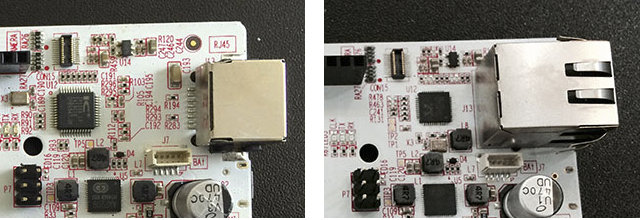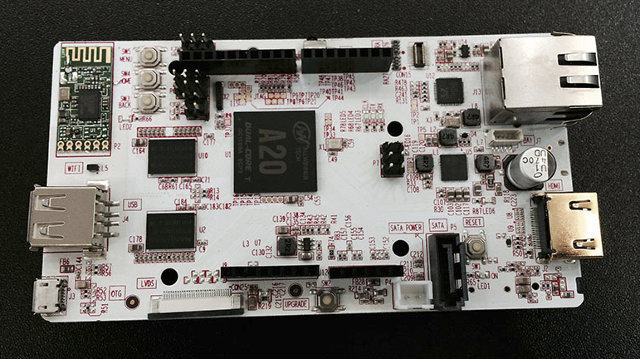pcDuino3 development board features Allwinner A20 dual core Cortex A7 SoC with support for SATA, HDMI, LVDS, Wi-Fi, Fast Ethernet, and Arduino compatible headers. Linksprite has now an updated version of the board that adds Gigabit Ethernet, while leaving the rest of the specs unmodified.
pcDuino3B (aka pcDuino V3B) specifications:
- SoC – AllWinner A20 dual core ARM Cortex A7 @ 1.0 GHz, with Mali 400MP2 GPU
- System Memory – 1GB DRAM
- Storage – 4GB NAND Flash, SATA connector, and microSD card slot (up to 32GB)
- Video Output – HDMI 1.4 with HDCP support, LVDS header
- Audio Out – 3.5mm analog audio interface, I2S stereo digital audio interface
- Connectivity – Gigabit Ethernet, 802.11 b/g/n WiFi
- USB – 1x USB host, 1x USB OTG
- Expansion Headers – Arduino UNO extension interface with 14xGPIO, 2xPWM, 6xADC, 1xUART, 1xSPI, 1xI2C.
- Camera – MIPI camera support
- Misc – IR receiver
- Power – 5V, 2000mA, support for Li-Po Battery
- Dimensions – 121mm x 65mm
The board can run Ubuntu 12.04 / 14.04, Fedora, or Android 4.2 with the images available on pcDuino3 Nano / pcDuino3B download page. Documentation, and tutorials are available on pcDuino3 page.

pcDuino3B sells for $59.99 on Linksprite store plus shipping, except if your order exceeds $99 in which case shipping is included. How you also find it on Ebay for $55 including shipping (Title refers to pcDuino3B, but description is for the 10/100M version, so better ask first). If you are based in Europe, you could consider order from EmbeddedComputer.NL or LDLC for a little over 60 Euros including VAT in order to avoid potentially nasty surprises from your local customs office.

Jean-Luc started CNX Software in 2010 as a part-time endeavor, before quitting his job as a software engineering manager, and starting to write daily news, and reviews full time later in 2011.
Support CNX Software! Donate via cryptocurrencies, become a Patron on Patreon, or purchase goods on Amazon or Aliexpress





